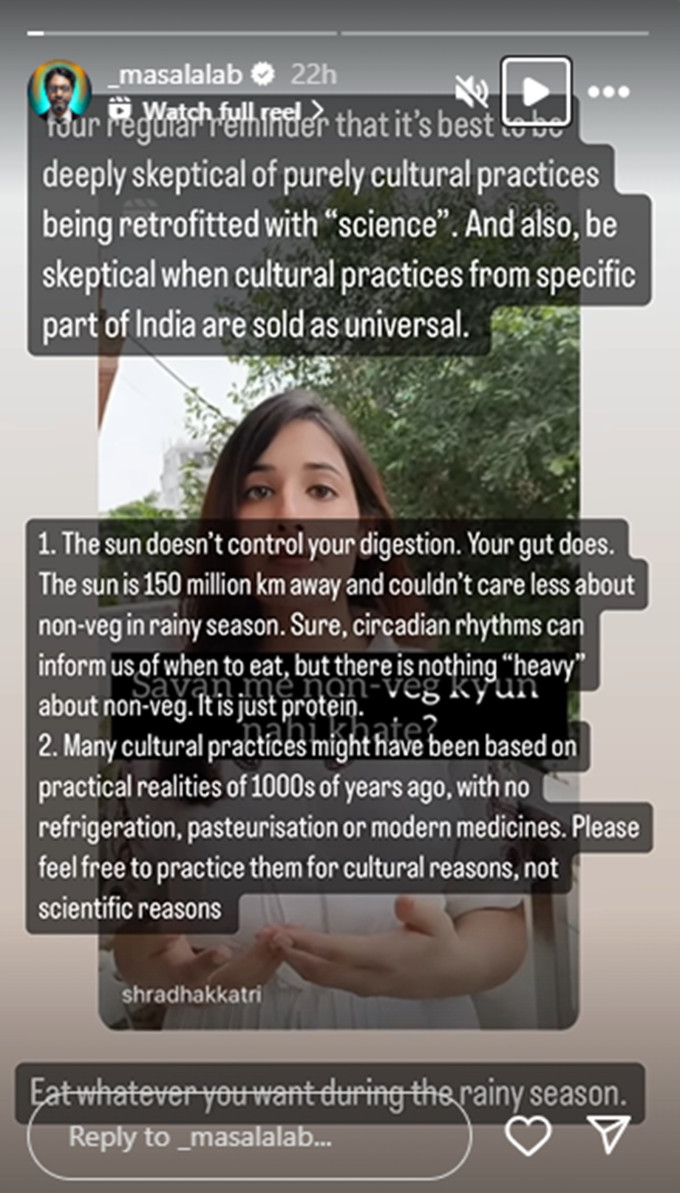Experts slam viral video claiming that the sun controls digestion during the holy month of Sawan
Author Krish Ashok recently took to social media to challenge a viral video that claimed the sun plays a crucial role in digestion during the Hindu month of Sawan.
In the video posted by Shrdha Krishn Kumar Atri, she suggests that eating habits should be altered based on the Sun’s position during this period.

Ashok debunked these claims by posting an Instagram story, mentioning, “Your regular reminder that it’s best to be skeptical of purely cultural practices being retrofitted with ‘science’.”
 The video, posted by Shrdha Krishn Kumar Atri, garnered significant attention online (Source: Instagram/Krish Ashok)
The video, posted by Shrdha Krishn Kumar Atri, garnered significant attention online (Source: Instagram/Krish Ashok)
To understand the implications of such misinformation, Kanikka Malhotra, consultant dietician and certified diabetes educator, sheds light on why these assertions are not only scientifically unfounded but also potentially harmful.
Importance of understanding the cultural context when discussing traditional practices or beliefs
Understanding cultural context is vital when discussing traditions, says Malhotra. It prevents misinterpretations, “like assuming dietary restrictions in Sawan solely affect digestion.” Instead, recognising the link to Lord Shiva shows respect for Hindu beliefs.
She adds, “Misrepresentation can have serious consequences. Traditions can lose meaning, stereotypes can form, and communities can face discord. By appreciating the ‘why’ behind traditions, we foster understanding, respect, and cultural harmony.
“And, no, the sun doesn’t directly control digestion in the rainy season. While there might be traditional beliefs linking the two, scientifically, digestion is a complex process governed by your gut health, dietary choices, and overall well-being.”
The rainy season can, however, impact digestion indirectly, Malhotra confirms. The humid weather can slow down your digestive system, leading to bloating or indigestion. This is why some cultures recommend dietary adjustments during this time, focusing on easily digestible foods and proper hydration.
Influence on public perceptions of both traditional practices and scientific knowledge
Sensational claims, like the sun controlling digestion during Sawan, can be a double-edged sword, harming both traditional practices and scientific understanding. They can make cultural practices seem outlandish, leading to the dismissal of their deeper meaning and cultural significance.
Malhotra asserts, “Science itself can also be tarnished by the misuse of scientific concepts, eroding public trust and making it harder to distinguish fact from fiction. This fosters a climate of polarisation and the spread of misinformation.”
To counter this, she suggests promoting critical thinking skills, strengthening science education, and encouraging respectful dialogue. By fostering understanding between these different ways of knowing, we can navigate this complex space and appreciate both tradition and scientific progress.
View this post on Instagram
A post shared by Shrdha Krishn Kumar Atri (@shradhakkatri)
Evaluating claims that combine cultural beliefs with scientific concepts
Critical thinking plays a vital role when evaluating claims that mix cultural beliefs with scientific concepts. Here’s how:
Malhotra mentions, “Critical thinking allows you to separate the cultural belief from the scientific claim. It also encourages you to assess the scientific evidence for the claim. Recognise that a cultural practice might not be scientifically proven but still hold value within a community.”
The focus in Sawan might be on devotion and self-discipline, with dietary restrictions acting as a symbolic element. “Consider if the cultural belief might offer an alternative perspective or interpretation of a scientific concept. Perhaps, the belief reflects an understanding of seasonal changes or the importance of mindful eating.”
Here are some tips for individuals to better assess such claims:
*Seek Reputable Sources: Look for scientific studies and research on the topic.
*Consider the source: Who is making the claim? Are they a scientist within the relevant field or someone promoting a specific belief system?
*Focus on the ‘Why’: Understanding the purpose behind the practice within the culture can shed light on its meaning.
📣 For more lifestyle news, click here to join our WhatsApp Channel and also follow us on Instagram
Disclaimer: The copyright of this article belongs to the original author. Reposting this article is solely for the purpose of information dissemination and does not constitute any investment advice. If there is any infringement, please contact us immediately. We will make corrections or deletions as necessary. Thank you.

